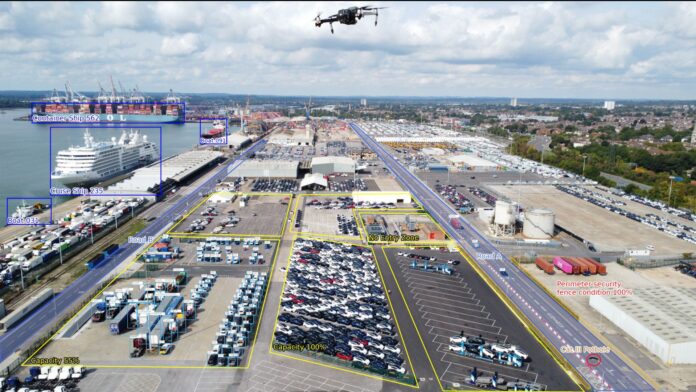BT noted that the project will demonstrate value in three use case areas for ports and highways, including port operations and management, marine operations and highway safety and defect inspections
U.K. carrier BT said that the government committed to provide financing for a project in which drones will be used to monitor critical infrastructure such as highways and ports.
The ‘Intelligent Drones for Port and Highways Technology’ (InDePTH) project, which is part of the ‘Future Flight Challenge Phase 3’ program, has received government backing, thanks to major new funding available via research agency UK Research and Innovation (UKRI), BT said in a release.
As part of the project, BT, Associated British Ports (ABP), Kier Highways, Connected Places Catapult, RoboK and Herotech8 are all working together to build and test the use of drones to carry out automatic ‘beyond visual line of sight’ (BVLOS) missions to monitor and control critical national infrastructure such as highways and ports.
Specifically, the project will demonstrate value in three use case areas for ports and highways, including landside port operations and management, marine operations and highway safety and defect inspections.
The main aim of the project is to create efficient solutions for infrastructure management with Unmanned Aerial Systems (UAS) and practically showcase opportunities for ports and highways to use ‘drones as a service’. Using AI and data analytics, the project will develop the InDePTH platform offering seamless integration from UAS imagery, through operational systems, to actionable insights.
A key aim of the project is to enable near real-time data transfer from capture to insight generation. Digital twins of ports and highways will be built and used with real-time data from drones to provide a clear picture of current operations, incidents and asset condition. AI will be applied to analyse drone imagery in several use cases, including maritime infrastructure inspection, reactive ad-hoc flights to quickly identify hazards both on land and over water and inspection and auto-classification of safety critical highway defects such as potholes, BT said.
John Davies, chief researcher at BT said “Working collaboratively, we can realize the true potential of drone technologies and develop the innovative new use cases that can add value to ports and highways and many other industries. Together we are taking a leading role in demonstrating the positive impact drones can have on the economy — specifically helping businesses to become more efficient and supporting the path to net zero.”
BT recently delivered a robotics platform and management system, as part of a project to explore the use of IoT and robotics in smart agriculture.
BT said that the main aim of the initiative is to drive automation, increase efficiency and improve environmental sustainability in agriculture.
Earlier this year, BT revealed a ‘charter’ to invest almost £100 million over the next three years in its new Division X digital change unit, which is at the heart of its broader strategy to establish itself as a ‘tech-co’, offering sundry IoT 5G, AI, and IoT technologies in flexible edge-cloud combinations to spur “industries like” manufacturing, logistics, transportation, and healthcare.
The new charter sets out BT’s strategy to provide its reportedly 1.2 million U.K. private enterprise and public sector customers with an edge-to-cloud “springboard” to “fuel innovation,” and, as per its list of target verticals, industrial revolution, as defined in the Industry 4.0 bible.

